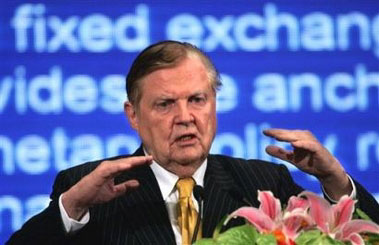|
Nobel Prize winners back booming China
By Liu Li (China Daily)
Updated: 2005-05-31 05:34
An award-winning US economist yesterday said China should ignore outside
pressure and keep the yuan exchange rate stable.
1999 Nobel Laureate for Economics Robert A. Mundell kept up his consistent
"no change" call at a special three-day forum--said to be Asia's biggest-in
Beijing yesterday.

Nobel prize
laureate Robert A. Mundell of Canada argues against a revaluation of the
Chinese Renminbi (RMB) during a speech for the Nobel Laureates Beijing
Forum 2005 at the Great Hall of the People in Beijing, China, Monday, May
30, 2005. 12 Nobel prize economic laureates will talk about issues ranging
from the currency, longevity, politics and economic growth during the
three-day event. [AP] | He was among seven other economic Nobel prize winners and five distinguished
scholars who gathered to offer advice and comment on China's economic
relationship with the global community.
Each gave their view of China's place in the world's economy.
If the Chinese currency were revalued, overseas direct investment will
decrease and lead to more unemployment, affecting even the rest of East Asia, he
said.
Wen: Listening to advice
Premier Wen Jiabao told the laureates China attaches importance to listening
to global advice and opinion.
Vowing to step up efforts to solve problems facing the nation, he added: "We
are confident and capable of achieving the goals set for economic and social
development."
The general consensus among the economists was the booming Chinese economy is
beneficial to the world-including the United States.
Robert W. Fogel, who won the Nobel Prize for Economics in 1993, told China
Daily that there were two reasons why the global community gained from China's
development.
"First, China is producing more and more goods that can be of a very high
quality and at a much lower price," Fogel said.
"Secondly, China will need more goods and services from other places such as
Europe and the United States," he said.
Citing American education as an example, Fogel said it had become an export
industry, pointing out that at least two-thirds of his students are from abroad.
Vernon L. Smith, the 2002 winner, said the huge and growing trade between
America and China greatly benefits both countries.
"By outsourcing to foreign countries, US businesses save money that is
available to invest in new technologies, new jobs and remain competitive in
world markets. We should let it happen," Smith said. However, "many American
citizens will not now agree with that."
"Their job losses are very visible while jobs created by new technology are
not yet visible. When American businesses outsource goods and services to China,
they save money," Smith said.
(China Daily 05/31/2005 page1)
|